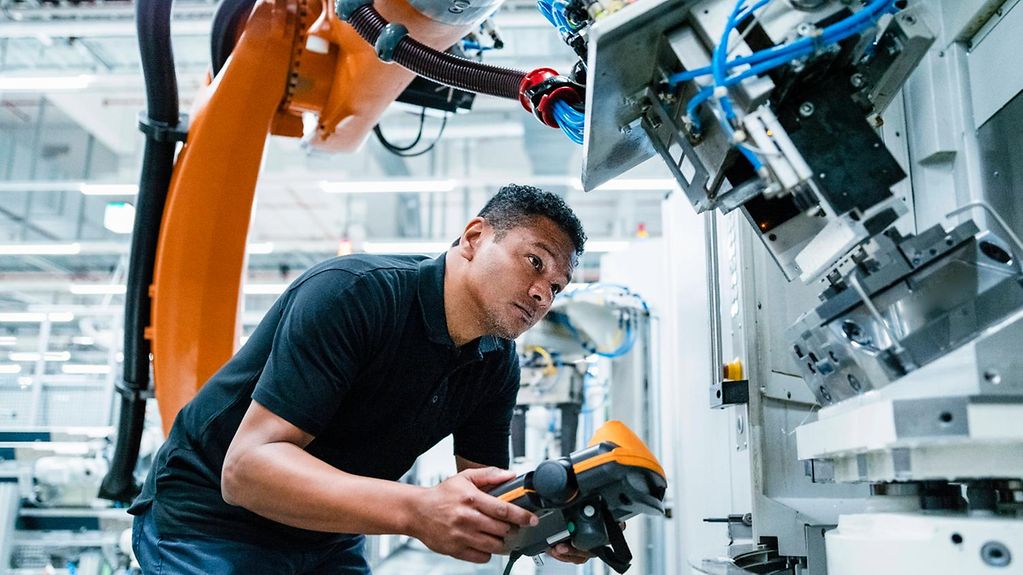The Federal Cabinet approves cornerstone policies
Because the number of job vacancies is at an all-time high, Germany is in urgent need of skilled workers. To attract more people from non-EU countries to work in Germany, the Federal Cabinet has adopted a set of cornerstone policies relating to the immigration of skilled workers from these countries.
3 min reading time

The new legal regulations are to be accompanied by efforts to promote Germany around the world as a modern and attractive immigration country.
Photo: imago images/Westend61
The Federal Government's "Cornerstone policies on skilled labour immigration from third countries" are intended to augment the Skilled Labour Immigration Act which has been in force since March 2020. The objective is to expedite the recruitment of skilled workers from third countries for the German labour market. Another aim is to give people from non-EU countries better opportunities to find jobs in Germany.
"To be able to compete for talent and auxiliary workers, we are offering new, and more importantly, more straightforward ways to work in Germany," said Federal Labour Minister Hubertus Heil following the cabinet meeting, adding that the goal was to create the most modern immigration legislation in Europe, "and to do so in a way that benefits everyone, including current residents and newcomers to Germany."
The "Cornerstones for skilled labour immigration from third countries" were submitted by five ministries: the Federal Ministry for Labour and Social Affairs, the Federal Ministry of the Interior, the Federal Ministry for Economic Affairs, the Federal Ministry of Education and Research, and the Federal Foreign Office. Draft legislation is currently being prepared under the auspices of the Federal Ministry for Labour and Social Affairs. This is to be presented to the Bundestag at the beginning of the coming year, according to Heil.
Going forward, labour immigration will be based on three pillars: skilled labour, experience, and potential.
The skilled labour pillar
The skilled labour pillar will continue to be the central element of immigration. As in the past, it includes the EU Blue Card and its favourable conditions for family reunification, permanent residence, and changing jobs, alongside the national residence permit for skilled workers holding a recognised qualification. Regardless of the degree they hold, these persons will be able to pursue any qualified occupation in non-regulated professions.
The existing salary thresholds for the EU Blue Card will be lowered and more attractive conditions will be created for new entrants. Another aim is to make it more attractive to take up vocational training or to study in Germany.
What are regulated and non-regulated professions?
Regulated professions are professions involving legally protected activities. Further entry requirements are often required. This applies, for example, to doctors and teachers. Non-regulated professions are not legally protected. The approximately 330 dual-system apprenticeships and many academic professions fall into this category. Further information on professional recognition is available on the Federal Institute for Vocational Education and Training website.
The experience pillar
The experience pillar provides skilled workers with the opportunity to immigrate even if their professional qualifications have not yet been formally recognised, provided that they have an employment contract in a non-regulated profession. They also require a professional qualification, at least two years' work experience, and a certain earnings level or to be covered by a collective agreement.
Those who hold a foreign qualification but do not reach the required salary threshold are already permitted to work in Germany under a recognition partnership agreement whilst completing the professional recognition procedure in parallel.
The potential pillar
The potential pillar is aimed at people who do not yet have an employment contract in Germany. The potential pillar is based on the introduction of a job search opportunity card, whereby the potential for sustainable integration in the labour market is determined by means of a points system, whose criteria include qualifications, language skills, professional experience, links to Germany, and age.
Promoting Germany around the world
The legal regulations are to be accompanied by efforts to promote Germany around the world as a modern and attractive immigration country as well as other practical relief measures. "Unfortunately," Heil explained, "the notion that all the skilled workers in the world want to come to Germany per se is an illusion." Among other things, he added, this is due to the German language, which is a competitive disadvantage compared to English-speaking countries, for example.
Collaboration with the respective institutions in the partner countries responsible for labour migration is to be expanded at the same time. Heil announced a recruitment strategy involving targeted campaigns in certain countries, which will be carried out in collaboration with the business community.